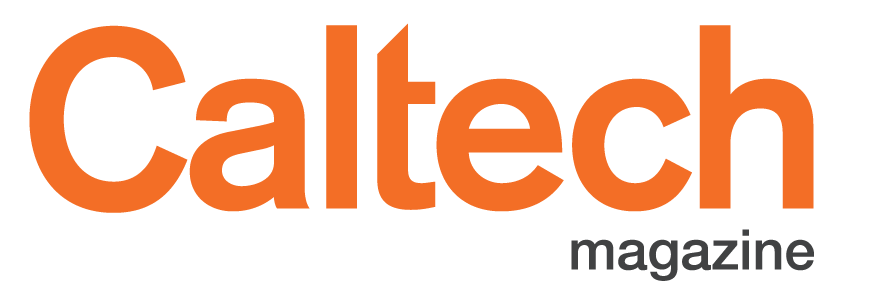Student Study: Sophia Chen
After overcoming an early deficit in a grueling recent tennis match, Sophia Chen had forced her opponent into a 10-point tie-breaking game to decide the contest when she tripped going after a shot and fell hard onto the court.
“My knee was bleeding pretty badly, and that’s not a good place to be in when you’re so close to match point,” Chen says.
But she got up, gripped her racket, and quickly landed several shots that her opponent struggled to return. “I ended up winning," she says, "so it was worth the fall.”
For Chen, 21, a senior and Newport Beach native, that tenacity and willingness to confront tough challenges has been a key asset during her time at Caltech, both on and off the court. She is pursuing an option in electrical engineering—which has a reputation as being among the most difficult options at Caltech—while serving as co-captain of the Caltech women's tennis team and as an upperclass counselor to her peers in Lloyd House. These roles make significant demands on a schedule that must already accommodate class time and about five hours of homework a day.
Typically, Chen wakes up in her room in Lloyd—where tennis equipment is piled on the floor, a desk overflows with homework assignments, and a One Direction poster graces the wall—at around 11 a.m. From a closet stocked with brightly colored clothes with intricate designs, she dresses and heads off for the day's classes, which include computer science courses on dynamic programming, data structures, and computing systems. Afternoons include either tennis practice—where she swings a smiley-face-adorned racquet—or a group massage for the team. Then there's dinner, homework from 6 to 11 p.m., and possibly a boba run. She might then relax with some of her housemates—watch some science fiction-themed TV shows like The Flash and Stranger Things, or maybe play a match of the strategy board game Settlers of Catan—before bedtime at about 2 a.m.
“Caltech is really academically challenging—I’m always super busy,” Chen says. But, she adds, that’s why she likes it. The Institute offers everything she loves: rigorous scientific study, tough athletic competition, and a tight-knit social group with whom she can just hang out and relax.
Chen, whose father is an electrical engineer, always had an aptitude for math and science growing up, often tinkering in middle school with electrical kits to build alarm clocks or voice-activated tone generators. By the time she reached high school, she had discovered she also enjoyed chemistry and physics; she even completed a senior project at Raytheon where she shadowed an electrical engineer for a day. After seeing the labs there and discovering the kinds of work her mentor performed, she says, “I realized, ‘This is what I want to do.' I decided to go into electrical engineering, and I haven't regretted it since.”
On arriving at Caltech, her first research assignment was to investigate the feasibility of creating an energy-harvesting device that could attach to the skull and use vocal vibrations to power a medical implant. “My professor told me what he wanted me to accomplish, but it was up to me to decide how I wanted to do it. So I bought some accelerometers, did some measurements on how strong the vibrations were, found different points on the head where they were strongest, and then got some energy-harvesting components and tried to build a setup.”
The process was challenging, but Chen was able to prove the harvesters could provide sufficient energy to run an implanted device. “That,” she says, “was super cool.”
Watch a video about Sophia Chen's life at Caltech.
Tennis has almost always been hand-in-hand with science for Chen; she started lessons in fourth grade. By the time she reached high school, “I got used to the competition." So when it came time to consider the type of school she'd attend for college, she says, "I didn’t want to give up tennis, and I wanted to stay on a team because I really like the team environment.” That actually worked in Caltech's favor; she knew she'd have a chance to play and make a difference on Caltech's team as opposed to, say, a big Division I school like UCLA.
“I made the right choice. Caltech was definitely a better fit for me,” she says.
She cites especially the the support of fellow scholar-athletes at Caltech, who face the same athletic and academic challenges that she encounters, as well as the opportunities she's had to lead others, a strength she had not previously realized she possessed.
When she became the tennis team's captain in 2014, she says, “I was very unsure. I tried to put on this facade, but I felt like people weren’t really going to listen to me. But soon I realized if I messed up, the team would still support me—they were really awesome. That gave me confidence to go out and try to be a leader in different areas, such as being an upperclassman counselor in my house.”
Athletics also allowed her to hone her time-management skills and has given her time away from her studies to recharge. “I know a lot of people who don’t do sports and they’re always procrastinating,” she notes. “But because I play tennis, I’m forced to allocate enough time to do problem sets. People ask me, ‘How do you do it? How do you have time?’ But tennis is how I do it. That hour or two of practice every day helps take my mind off academics so that when I go back to doing sets, I have a fresh mind and I’m ready to work again.”

